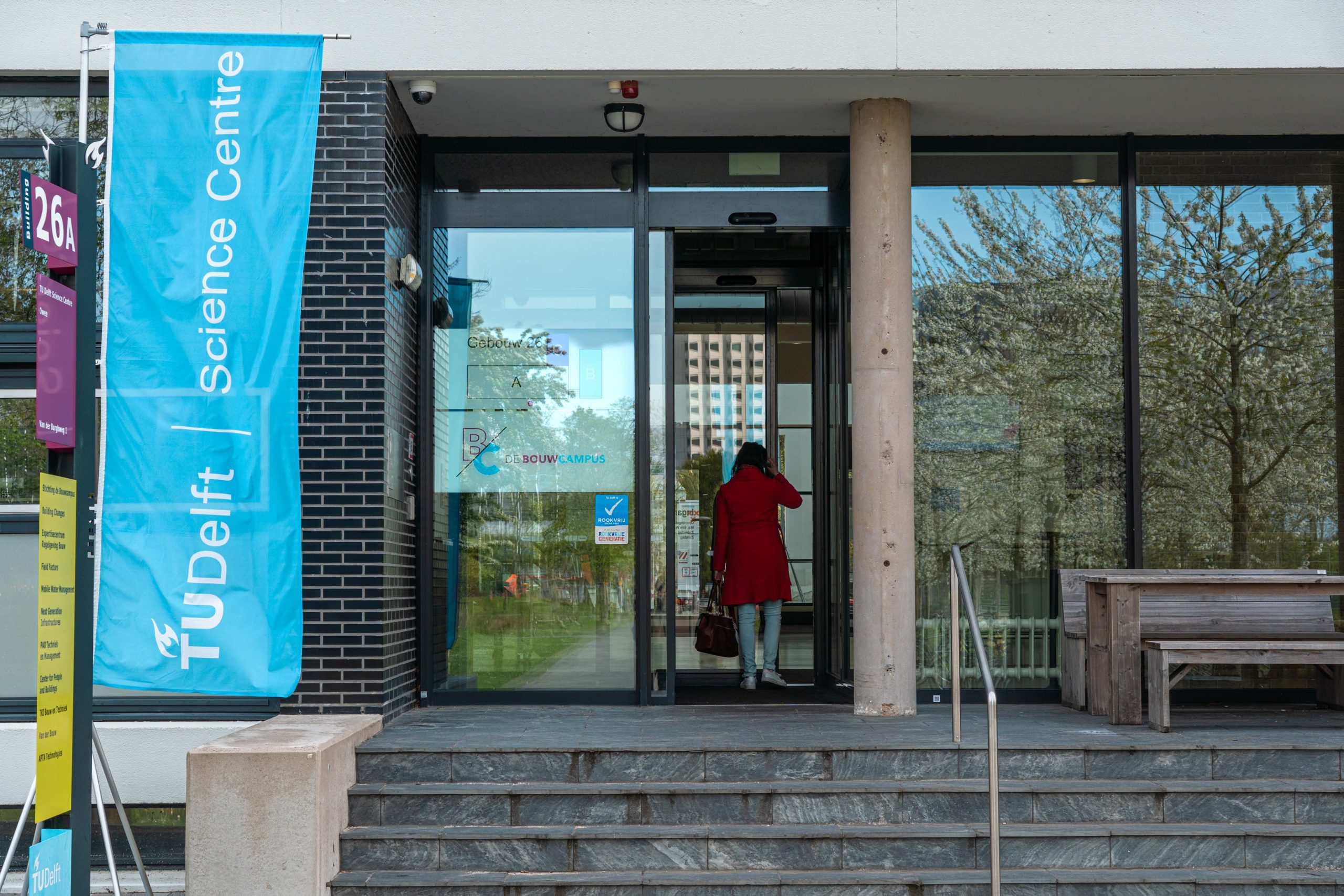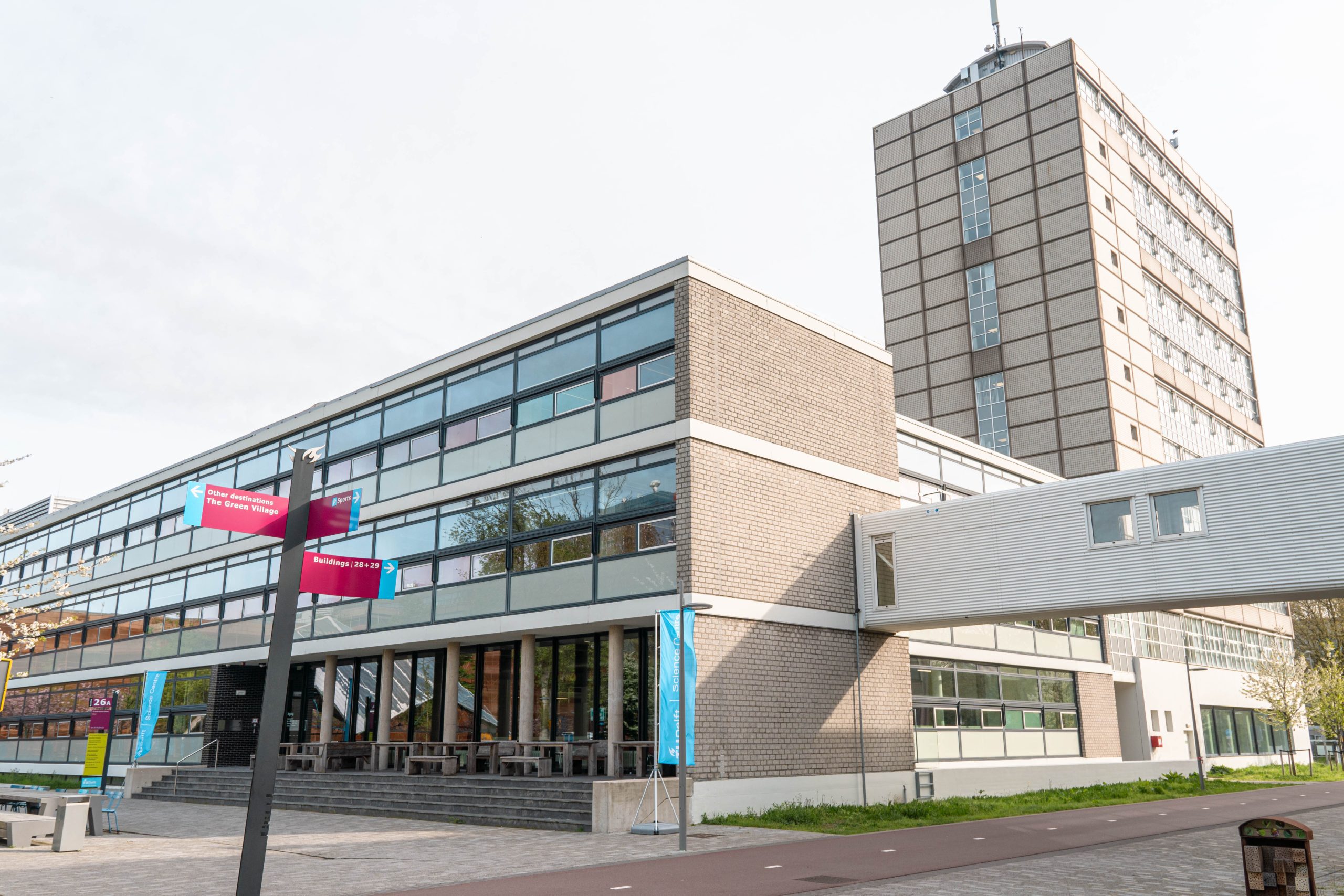The building that houses I&IC. (Photo: Thijs van Reeuwijk)
The Executive Board has imposed a duty of confidentiality on the management team of the Innovation & Impact Centre (I&IC) regarding the performance of the Director appointed on 1 April 2023. It has brought about such a level of uncertainty and frustration among I&IC staff members that they feel hurt. Twelve staff members spoke to Delta about a loss of confidence in Rector Magnificus Tim van der Hagen, the Director of Human Resources, and the Ombuds functionary. How one issue illustrates the conclusions of the Inspectorate of Education: welfare of employees at TU Delft is not being mismanaged
This article in 1 minute
- In the autumn of 2023, 15 staff members of the Innovation & Impact Centre reported complaints about the new Director to TU Delft’s external confidential advisor.
- The confidential advisor compiled a report that listed various issues including transgressive behaviour and managerial bullying. This led to a follow-up investigation after which the Director did not turn up at work anymore.
- On 22 December 2023, the 15 individuals received a message from the external confidential advisor originating from the Executive Board that they see as a threat: the I&IC Management Team imposed an obligatory duty of confidentiality on them which, if they infringed it, would lead to them being dismissed.
- Everything is connected to the duty of confidentiality: the unclear situation in which the 15 complainants and the other employees find themselves; the lack of direction; and, supervisors who look worse and worse and are often ill.
- These issues and more emerged during a fraught staff meeting on 7 March 2023, not even one week after it was made known that the Inspectorate of Education was of the opinion that the conditions for employees at TU Delft was not in order and there was mismanagement right up to the top.
- What then followed was another highly emotional staff meeting, initiated by 11 staff members on behalf of another 87 colleagues, with Rector Magnificus Tim van der Hagen and the Head of Human Resources Annemieke Zonneveld. A meeting that left the staff members in despair.
- In this process, the ombudsman infringed the confidentiality of two staff members in front of the personnel.
- Confidence in the Executive Board, the Human Resources department and the ombudsman were lost in one go. Staff members do not know to whom they can turn in unsafe social situations.
- At least two staff members recently filed complaints at the Inspectorate of Education.
- This article has been offline for more than two months. You can find more information about it below this article.
Good Morning,
In response to the inventory, Tim has asked me to send you the following:
———
The Executive Board wants to emphasise again that confidentiality about this issue is essential. The I&IC MT members have been informed by the Executive Board that should the confidentiality be breached, that measures will be taken regarding employment. We trust in your discretion.
———
Best regards and happy holidays.
Fifteen staff members of the Innovation & Impact Centre received this message in their inbox on Friday 22 December 2023. Sender: Carin van der Hor, the external Confidential Advisor of TU Delft. In the months leading up to this, all 15 had reported concerns about incidents in their department to her. Van der Hor summarised their complaints in a report that she presented to the Executive Board and Human Resources. When the Executive Board asks her to pass on the above message, she is obliged to do so. The Executive Board does not know the people who filed the complaints. Van der Hor says that it is usual for a confidential advisor to send a message like this. After all, there is no other way for the organisation to reach anonymous complainants and she believes that communications between both sides must remain open. So Van der Hor copied the rules about the duty of confidentiality and pressed the send button. What the reporters should do with this message they do not know, but they draw the conclusion that they should keep quiet.
‘Why did I turn up?’
All 15 complainants filed complaints to Van der Hor about the new Director of I&IC independently of each other. They had already received a summary of Van der Hor’s report, but on 22 December they received an unwelcome surprise. The unclear situation in which they were working; the lack of direction; supervisors who looked worse and worse and were often ill were all connected to the duty of confidentiality.
Wild speculation
The subject of that duty of confidentiality is the Director. The lack of communication had caused the wildest speculations about him to circulate for months. Hardly surprising as from the start when he was appointed, hardly anyone was aware of what he was doing. He was absent regularly and since November 2023, has not appeared in the office at all. Nobody is saying what the situation is. Since autumn, everyone has had to act as if he would turn up to appointments, but these were always cancelled at the last minute. I&IC works intensively with external contacts [/cheerup_read_more] The Innovation & Impact Center brings in major collaborative contracts with external parties. , which makes these last-minute cancellations even more unworkable. The external contacts regularly as I&IC staff what the point was of turning up. The staff are unable to answer this question.
Christmas holidays
The date on which the above message was sent, 22 December 2023, is salient. It is just before the Christmas holidays. It is exactly one year after the Inspectorate of Education called on TU Delft employees to report to them if they have experienced undesirable behaviour on the shop floor. At the time, the date was a source of much irritation to the Executive Board. The timing would ruin the Christmas parties and holidays of TU Delft employees. This led to the Executive Board making that Thursday, 22 December 2022 a point of criticism. But one year later, on 22 December 2023, one day before the Christmas holidays, the complainants to the confidential advisor receive the email that they view as a threat. If their supervisors threaten dismissal if they open their mouths, what will happen?

Smartwatch
To understand how it could get this far, we need to go back to April 2023. The new Director of I&IC begins. The Executive Board is ‘pleased with his appointment’ and says that ‘We have every confidence that under his leadership I&IC can strengthen our current alliances and initiate new ones’. The director too is looking forward to it. But doubts quickly arise in I&IC about his performance. People do not see him actually working. Discussions and meetings almost always cover personal subjects, and he constantly looks at his smartwatch.
The staff see practical problems piling up
Not everyone interprets these examples in the same way though. While one person sees a lack of direction, vision and clarity, another gives the newcomer the benefit of the doubt and does not find it unpleasant that he approves every proposal. And then there are the people who do not notice the worries. About 170 people work at I&IC, and a lot of them do not have to deal with the Director directly.
No for an answer
For those that do, the surprise and dissatisfaction about the Director’s performance grows every week. Several people first try to discuss this with him. Without effect. They then turn to Rector Tim van der Hagen and the Director of Human Resources Annemieke Zonneveld, but again get no for an answer.
In the meantime, staff members see that the practical problems are piling up, but what exactly is going wrong is not clear. Some blame their own supervisors as they either avoid the questions or give meaningless answers. This is leading to a shared frustration, irritation and anger. Staff members do not feel that they are being taken seriously.
It was only at an I&IC staff meeting on 7 March 2024 that they understood that their supervisors are in an impossible situation. More than a week previously, on 27 February, the staff of I&IC, just like everyone at TU Delft, received a brief Executive Board message. In the message, the Executive Board thanked the Director for his services and announced his departure which would take effect on 1 June 2024. In the same message, after less than one year at TU Delft, the Director stated that he had decided that the time had come for ‘a new direction’ in his career that would match his ‘long term goals and aspirations’. The Executive Board wrote that it ‘regretted’ this decision, but that it ‘respected’ it.

Disbelief
The Executive Board message raised countless questions among staff members. On 7 March 2024, they were given ample opportunity to ask the Management Team questions. At least this was what was stated on the invitation to the staff meeting. Yet again, there were no answers. The employees were told that they should look to the future. Something snapped for some of them. After months of frustration and rising tension about the lack of communication and decisiveness, people burst into tears. One of the complainants to the Confidential Advisor could not take it anymore and said that MT members had imposed a duty of confidentiality on pain of dismissal.
The substance of the Inspectorate of Education report is suddenly painfully recognisable
The message blew people hit the attendants hard. Disbelief ruled. Not even one week previously, on 1 March, just like the whole of the Netherlands, the people present read that the Inspectorate of Education accused TU Delft of mismanagement up to the highest level for not arranging proper working conditions for its employees. The substance of the report is suddenly made painfully recognisable The mood changes. The MT members get support and sympathy. After so many months the frustration is no longer directed at them but at the layer above them: the Executive Board and the HR Department. They were the ones, after all, who imposed the duty of confidentiality.
At that point, by far most of the staff members do not know that 15 colleagues had filed complaints at the Confidential Advisor, who issued a report to the Executive Board and HR on this in October 2023. The report led to an independent external investigation into the performance of the I&IC Director. This is often done if a confidential advisor issues a serious warning (see point 3.3 in the 2022 Confidential Advisors annual report [in Dutch]).
The nagging insecurity among those involved will only come to an end on 25 March
Nagging insecurity
Both investigation reports are confidential. However, several people involved confirm that both investigations – that of the confidential advisor and that of the external firm – arrived at negative conclusions. Two sources share the terms in the report by the confidential advisor with Delta. In the case of the Director, there would have been inappropriate behaviour, mismatch, managerial bullying, integrity issues and unprofessional behaviour.
From November 2023 onwards, the Director did not appear in the office anymore.
While the investigations into the performance of the ever more frequently absent Director for months are ongoing, the I&IC staff hear nothing. The 15 people who filed complaints to Van der Hor, the Confidential Advisor, also do not know what is going on after her report is issued. From November 2023 onwards, the Director did not appear in the office anymore, even though he will continue to sign documents from a distance until deep in 2024. As it is not clear for everyone that he is and will continue signing documents, this is sometimes causing delays. At the top of the Executive Board’s message about the departure of the Director is a statement that he will remain in service until 1 June 2024. The nagging insecurity among those involved will only come to an end on 25 March when they will receive a brief confirmation that an interim Director will take office three days later.
‘A lot of colleagues were affected by the situation and many of us became very emotional at the meeting’
Invitation
The effects of the complete lack of certainty has been building up among I&IC staff for months. They are not content with the meager explanations given to them at the March 7 staff meeting. After the heavy and emotional meeting, a group of 11 staff members gets together and talks about what they can do. They decide to ask Rector Van der Hagen and HR Director Zonneveld for an explanation.
On 11 March they email Van der Hagen and Zonneveld on behalf of a group of 87 staff members. They write: ‘A lot of colleagues were affected by the situation and many of us became very emotional at the meeting. As I&IC staff members, we are very concerned. The lack of communication, explanation, clarity and transparency is having a major impact on our work. […] In connection of an open culture in which everyone can feel seen and heard, we would appreciate it if you – the supervisor of our soon to be former Director – would enter into a conversation with us, give us the opportunity to have our questions answered, and address our concerns.’ Van der Hagen and Zonneveld agree to meet with them on 21 March.
Confidentiality breached
They miss the opportunity to return peace to I&IC, writes I&IC staff member Jan Schiereck on 22 March in a letter to the editor in Delta. A report of the meeting, an enclosed email – both in the possession of Delta – and several people present confirm that impression. More about the report below.

First, the way in which the meeting came about as this too seems to be a cause of dissatisfaction. This was explicitly stated in the meeting and thus was known to all those present. It concerned the role of the ombudsperson for staff, Birgitte Peters. She was requested by two staff members – as appears from her own response below this article – to think about how the discussion between the I&IC staff members on the one side and Van der Hagen and Zonneveld on the other, could best be arranged.
Apologies
To their utter surprise, the ombuds functionary breaches the confidentiality in her communication. She puts both staff members among the recipients of an email to Van der Hagen and Zonneveld, while she had explicitly stated that she would handle their contact information confidentially. Delta has access to the email and the email exchange that ensued, in which the ombuds functionary expresses her apologies.
In that email exchange, the ombuds functionary advises Van der Hagen and Zonneveld against holding a big staff meeting in which they would both have to answer questions on the spot, but to meet in a smaller committee. The two staff members do not agree to this. After all, Van der Hagen and Zonneveld had already agreed to a meeting with all I&IC staff members. Furthermore, the ombuds functionary suggests to hold the smaller meeting on the same day and at the same time as the big meeting. Despite this, Van der Hagen responds quickly and enthusiastically to the advice of the ombuds functionary, writing that he would be pleased to follow it.
‘The Executive Board has put a lot of energy into a 172 page response to the Inspectorate of Education report, which is even larger than the report itself. We received a five line email about the departure of our Director. What a stark contrast.’
Torn apart and exhausted
After sending a resolutely rejecting email to the involved staff members, he turns around. As agreed, he and Zonneveld would come to the large meeting as agreed. It was a difficult hour. Breaks had to be taken several times as the emotions escalated. People were angry or cried.
In the report of the meeting, one staff member first described the atmosphere at I&IC. ‘I see people walking around who are literally bent double under the problems they face. Supervisors who feel torn apart and are exhausted.’
‘Many people have deep wounds which will not heal without help’
It also says: ‘We are not getting any information, no answers to questions about what we need to communicate to our contacts, be they internal, external, the municipality etc. This also affects our credibility and reputation. We are utterly ashamed. It now appears that there will be an interim manager (as can be read above in this article, the announcement about the interim director was issued four days after the staff meeting on 25 March, Eds.). About this too there is no centrally coordinated, clear communication from the Executive Board. The Executive Board has put a lot of energy into a 172 page response to the Inspectorate of Education report, which is even larger than the report itself. We received a five line email about the departure of our Director. What a stark contrast.’
Dozens of questions
And, ‘Our collective experience is that the legal procedures and the amount of the buyout is more important than the well-being of 170 staff members in our department. We have dozens of questions and do not feel heard or taken seriously as intelligent and driven professionals. The conditions which would allow us to carry out our work well are lacking. People leave, get ill or even worse. Talented and very much appreciated staff members leave – and they even feel guilty that they leave their colleagues behind to pick up the pieces … As a group, the I&IC has felt abandoned and neglected for a long time.’
The organisers of the meeting on 21 March sent their report to the Executive Board, the HR Director, and the Works Council on 21 March. The accompanying email states that the I&IC staff members ‘are completely willing to work on a healing process and are looking to the future’. ‘However, we are disappointed to see that this is left to us. Many people have deep wounds which will not heal without help. An interim Director with a wide and complex area of work cannot do this alone. The Executive Board and HR are thus essential.’

Exactly the same the next time
Van der Hagen responds by saying that he ‘understands the anger in the hall and is affected by the story’. What then follows is hard to swallow for many of those present, it appears from the report and from discussions that Delta had with various attendees. The Rector says that he and HR were not able to act otherwise, that confidentiality is the top priority, and that should a similar case arise again, it would be dealt with in the same way. He concludes that the handling of the situation in this way ‘worked’, which Zonneveld agrees with. Further, both say that MT members could have shared information.
How they could have done this while they were being threatened with dismissal if they infringed the duty of confidentiality imposed on them is not clear. Later, Van der Hagen and Zonneveld confirm that the MT members cannot be accused of anything.
Staff members request apologies, which as yet have not been given
From the report, the accompanying email and the discussions with those involved, it appears that many staff members are not at all ready to look to the future, as the Executive Board would like. All those involved speak of a lack of confidence in the Executive Board, the HR Service and the Ombudsman. Staff members say that in the light of everything that has happened, they have absolutely no idea where they should report an incident of transgressive behaviour. They ask for apologies for the everything that has happened. These have as yet not been forthcoming.
To the Inspectorate again
The I&IC story illustrates the Inspectorate of Education’s conclusion that the care for staff members at TU Delft is not in order. This is the reason that at least two people involved have filed new reports at the Inspectorate. Through a spokesperson the Inspectorate said that for reasons of confidentiality, they cannot confirm this. But the spokesperson also says that a case that reflects what the Inspectorate has determined could be used in the follow-up investigation that they will carry out at TU Delft.
With the cooperation of Annebelle de Bruijn
Reactions and journalistic accountability
Executive Board and Human Resources
On 11 April, Delta requested Rector Van der Hagen and Director Zonneveld of HR for an interview regarding the adversarial procedure, after it had previously submitted an interview request to the Rector in which it would ask questions about I&IC. That interview did not go ahead. On 11 April, a spokesperson announced that the decision had been taken to have a ‘break from the media during this phase of compiling the plan for improvement so that the process can continue without disruption’.
Nevertheless, on 12 April Delta listed all the findings that have a bearing on the Rector and the HR Director in an email to them, including the question of whether they were prepared to offer their apologies. Later that day, they also sent the following statement:
‘We are closely involved in and concerned with the problems at the I&IC Department. The staff at I&IC are going through a difficult period. Recent events have given rise to feelings of anxiety and disquiet. No staff member wants to be in a situation like this. As an employer, we are also closely involved in a process of reinstating good relationships and a good work atmosphere, and are strongly committed to this.
Given our position as an employer, we receive a lot of information that is highly personal and that is shared with us confidentially. This means that it is impossible for us to respond to the questions regarding your article given our wish to comply with their confidentiality and our respect for the colleagues in question. We are not free to share information that could be traced to individuals. We have spoken at length with the MT members of I&IC, including about the people who have been affected. In this case too, it is necessary that this information is and must remain confidential.’
Ombuds functionary for staff
Delta also requested the ombuds functionary, Brigitte Peters, for an interview by email on 11 April. The answer received was a demand that this be published in full. In terms of journalism, it is highly unusual to concede to a request like this. However, Delta did publish it in full, including some comments beneath it.
‘As an ombuds functionary, I have a duty of confidentiality which I carry out accordingly. That a journalist approaches me about my confidential position is highly uncomfortable, given that my position revolves around people – including myself – feeling protected by that confidentiality. The Editor in Chief of Delta approached me announcing that she has access to ‘various documents and several witness reports in which my actions in this case file are viewed as problematic’. Delta does not say which documents they refer to and who the ‘witnesses’ are. I do not respond to anonymous allegations. I assume that it is in connection with the I&IC staff meeting of 21 March last and the views of two I&IC staff members involved in organising the meeting regarding my advice to them, the Executive Board Chair and the Director of HR. The two I&IC staff members approached me asking if I would be prepared to act as the moderator for the objective of ‘how we can safeguard everyone’s safety, including for Executive Board Chair Tim.’ As I considered this a potentially fruitful approach, I met with an expert and the two I&IC staff members for one and a half hours to discuss how best to arrange the meeting. The next day they informed me – with no explanation whatsoever – that they did not want to proceed with me, adding that ‘We will contact Tim ourselves to discuss how we intend to arrange the meeting’. My wish was to support this process with well-intentioned professional advice: consult with each other about the expectations and the purpose of the meeting. I was hoping that a good foundation would be laid for improving the communications within TU Delft (Executive Board-I&IC and vice versa). I would view it as wrong if my sincere intention would be interpreted differently.’
The ombuds functionary’s accusation to Delta is presumptuous as she is making assumptions about an interview that has not yet taken place. Delta would share information as a matter of course, insofar as confidentiality would permit this. Delta has informed the ombuds functionary accordingly. Thereafter, on 12 April Delta submitted the findings about her actions to her with the request to respond to these points. The ombuds functionary responded with the request to be left alone.
In contrast to what is said in the statement above, the email exchange shows that the two I&IC staff members did not ask the ombuds functionary to act as a moderator, but instead to advise them on who would be suitable for this role.
External Confidential Advisor
Delta briefly spoke to Carin van der Hor, the Confidential Advisor, as said at the start of the article. She says that “However much this affects me, I cannot go into individual cases. I see that all these events are creating problems and this is terrible.” Referring to the email of 22 December, she also says that “I should have said that the only thing I could do was to forward it. I cannot discuss the content.”
Director I&IC
After several attempts over the past weeks to hear a rebuttal, Delta again approached the former I&IC Director by email, WhatsApp and telephone on 12 April. The findings about him were shared with him by email with a note saying that Delta would shortly publish an article about I&IC that would be partly about him, and asking him to let them know that same morning if he was willing to give a response. He has not been willing to respond substantively.
Methodology
For this article, Delta interviewed eight people involved on the record and carried out background interviews with another four. This article is based on their stories, the notes that they had made over the last year, several original emails and email exchanges, and on the report of the meeting on 21 March.
Above in the article is a quote saying that apart from the Director, several I&IC staff members will leave or have left. Delta verified this about the four individuals either with the people involved themselves or through other sources.
Several people have read parts of a confidential document. Delta deemed this justified given that it is of great relevance to the staff members at TU Delft. This also applies to keeping these sources anonymous. In terms of journalism, this can be justified if it serves a major interest and would otherwise entail a major risk of negative consequences for whistleblowers and sources.
There are still many unanswered questions. Given the potential traceability to individuals, we have not written everything in detail.
- Delta is continuing to keep track of developments. If you have any tips, report them on tudelta@protonmail.com. Your information will be handled confidentially.
Update 21 June, 2024
This article was originally published on 15 April, at 11:48 AM. That same day, around 8:00 PM, the editors removed it under protest. On 21 June, we republished it, on the original date. You can find more background on that process here.
Changes when republished, after seeking legal advice:
- We removed one streamer and replaced it with another, because we did not feel it necessary to put additional emphasis on the qualifications from the trustee’s report.
- The director’s name had already been removed before we took this article offline. We left it that way.
Do you have a question or comment about this article?
s.m.bonger@tudelft.nl


Comments are closed.